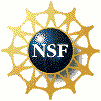
FY 2001 - 2006
| CONTENTS About the NSF NSF Role I. Introduction II. Vision and Mission III. Outcome Goals IV. Strategy Appendices: Appendix 1: Critical Factors for Success Appendix 2: External Factors Affecting Success Appendix 3: Assessing NSF’s Performance Appendix 4: Integration of NSF Plans with those of Other Agencies Appendix 5: Resource Utilization Appendix 6: Linking the Strategic Plan to the Performance Plan Appendix 7: Crosswalk of NSF Goals and Programs How We Operate Our Attributes National Science Board Director's Policy Group |
About the NSF
Created in 1950, NSF is an independent U.S. government agency responsible for advancing science and engineering in the United States across a broad and expanding frontier. Operating no laboratories itself, NSF makes merit-based grants and cooperative agreements and provides other forms of support to educators and researchers in all fifty states and in the U.S. territories.
NSF supports education and training at all levels, from pre-kindergarten through career development; promotes public understanding of science, States has world-class scientists, mathematicians and engineers. Together with NSF’s support for leading edge research, its educational activities are critical to sustaining the Nation’s economic strength and ensuring the well being of all Americans in the 21st century.
NSF invests in the best ideas from the most capable people, determined by competitive merit review. NSF evaluates proposals for research and education projects using two criteria: the intellectual merit of the proposed activity and the broader impacts of the activity on society.
Competition for NSF support is intense. Each year, NSF receives about 30,000 proposals for research and education projects and about one-third of them are funded. Awards typically go to universities, colleges, academic consortia, nonprofit institutions, and small businesses. NSF also supports collaborative projects between universities and industry and U.S. participation in international cooperative research and education efforts.
Numerous advisors from the science and engineering community assist NSF staff members in identifying areas of promise with maximum opportunity for breakthroughs. Reliance on the science and engineering research and education community enables NSF to be both intellectually decisive and cost-efficient.
The National Science Foundation is governed by the National Science Board (NSB). The Board is composed of 24 part-time members, appointed by the President and confirmed by the Senate. The NSF Director serves on the Board, ex officio. The Board has dual responsibilities: as a national science policy advisor to the President and the Congress, and as the governing body for NSF.
| NSF ~ OD ~ OIA | |